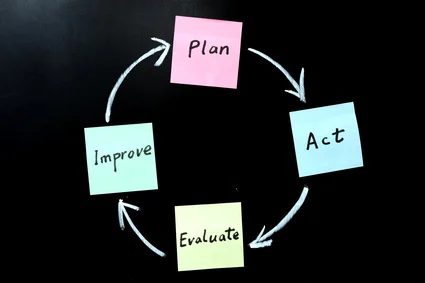In today’s fast-paced business climate, organizations are constantly looking for ways to work on their operational effectiveness and stay serious. This is where business process management (BPM) consulting becomes an integral factor. Business process management consulting includes analyzing and advancing business processes to enhance efficiency, decrease costs, and further develop consumer loyalty. This blog investigates the critical stages to powerful business process management consulting, with an emphasis on the advantages of Business Process as a Service (BPAAS) and Business Process Reevaluating (BPO) services.
Prior to embarking on any process improvement initiative, it is essential for BPM consultants to gain a profound understanding of the client’s business. This includes directing preliminary gatherings with key stakeholders and gathering information on the client’s ongoing processes. By understanding the client’s goals, challenges, and pain focuses, consultants, can tailor their approach to really address explicit necessities.
Process Analysis and Mapping
The following stage in powerful BPM consulting is to analyze and map the client’s current processes. This includes evaluating work processes, strategies, and frameworks to distinguish bottlenecks, failures, and areas for development. By creating process maps and flowcharts, consultants can visualize the client’s processes and pinpoint areas that require optimization.
Setting Clear Objectives
To drive fruitful process improvement, laying out clear objectives is crucial. Consultants need to work intimately with the client to characterize explicit goals and targets. These targets ought to be aligned with the client’s overall business strategy to guarantee that process enhancements add to the organization’s drawn-out progress. Besides, consultants ought to establish measurable Key Performance Indicators (KPIs) to track progress and evaluate the viability of the carried-out changes.
Proposing Solutions and Strategies
Based on the analysis led, BPM consultants ought to propose tailored solutions and strategies to address the client’s particular necessities. This may include tweaking business process solutions to advance work processes and maximize proficiency. Additionally, consultants can present BPAAS and BPO services as choices to leverage external skills and assets. It is essential to introduce a money-saving advantage analysis of the proposed strategies to assist the client with making informed choices.
Implementation Planning
When the proposed solutions are accepted, a detailed implementation roadmap should be created. This roadmap frames the bit-by-bit process of executing the proposed changes, including assigning jobs and obligations to individuals included. It is crucial to create a realistic course of events for execution, taking into account the client’s assets and operational constraints. Successful communication and coordination among stakeholders are essential during this phase.
Change Management and Employee Engagement
Carrying out process changes frequently experiences resistance from representatives. BPM consultants actually must address this resistance by emphasizing the advantages of the proposed enhancements and including representatives in the process improvement venture. By requesting their feedback, giving training, and offering support, consultants can gain purchase from the labour force, leading to smoother and more fruitful implementation.
Integration of Technology and Automation
In today’s digital era, integrating innovation and automation into business processes is vital for effectiveness and scalability. BPM consultants ought to distinguish appropriate software and devices that align with the client’s prerequisites. Integrating BPM software with existing frameworks enables seamless process management, data analysis, and announcing. BPAAS can additionally facilitate process automation, allowing organizations to improve their operations while zeroing in on center business activities.
Continuous Monitoring and Evaluation
To guarantee sustained process improvement, ceaseless observing and evaluation are essential. Consultants ought to carry out performance-tracking mechanisms and regularly analyze KPIs and process measurements. This continuous assessment allows for the convenient identification of deviations or failures, enabling brief remedial actions. Regular surveys and audits give chances to additional refinement and optimization.
Fine-Tuning and Optimization
Recognizing areas for additional improvement is a critical stage in viable BPM consulting. By analyzing data and gathering feedback, consultants can distinguish additional optimization from amazing open doors. Making data-driven choices refines processes and maximizes their impact. Through an iterative approach, consultants can constantly enhance business processes to achieve more significant levels of proficiency and efficiency.
Ensuring Long-Term Sustainability
Business processes should be adaptable to changing market dynamics. BPM consultants ought to incorporate adaptability into the process improvement strategies to guarantee long haul sustainability. This includes regularly surveying and updating BPM strategies to align with developing business needs. Leveraging BPO services can give progressing process management support, allowing organizations to zero in on their center capabilities while profiting from external aptitude.
Client Feedback and Satisfaction
Gathering feedback from clients is crucial to assessing the progress of the process improvement initiatives. BPM consultants ought to actively look for feedback on the executed changes, address client concerns and ideas, and measure client satisfaction and achievement. This feedback circle assists consultants with refining their approach and assembling more grounded client relationships.
Conclusion
Viable business process management consulting requires a systematic and far-reaching approach. By understanding the client’s business, analyzing processes, setting clear goals, proposing tailored solutions, and engaging representatives, consultants can drive fruitful process upgrades. Integration of innovation, consistent observing, calibrating, and guaranteeing long-haul sustainability are key components in achieving sustainable outcomes. Leveraging BPAAS and BPO services can give organizations the mastery and assets required for continuous process optimization. By following these key stages, organizations can enhance their operational effectiveness, lessen expenses, and gain an upper hand in today’s dynamic business landscape.










